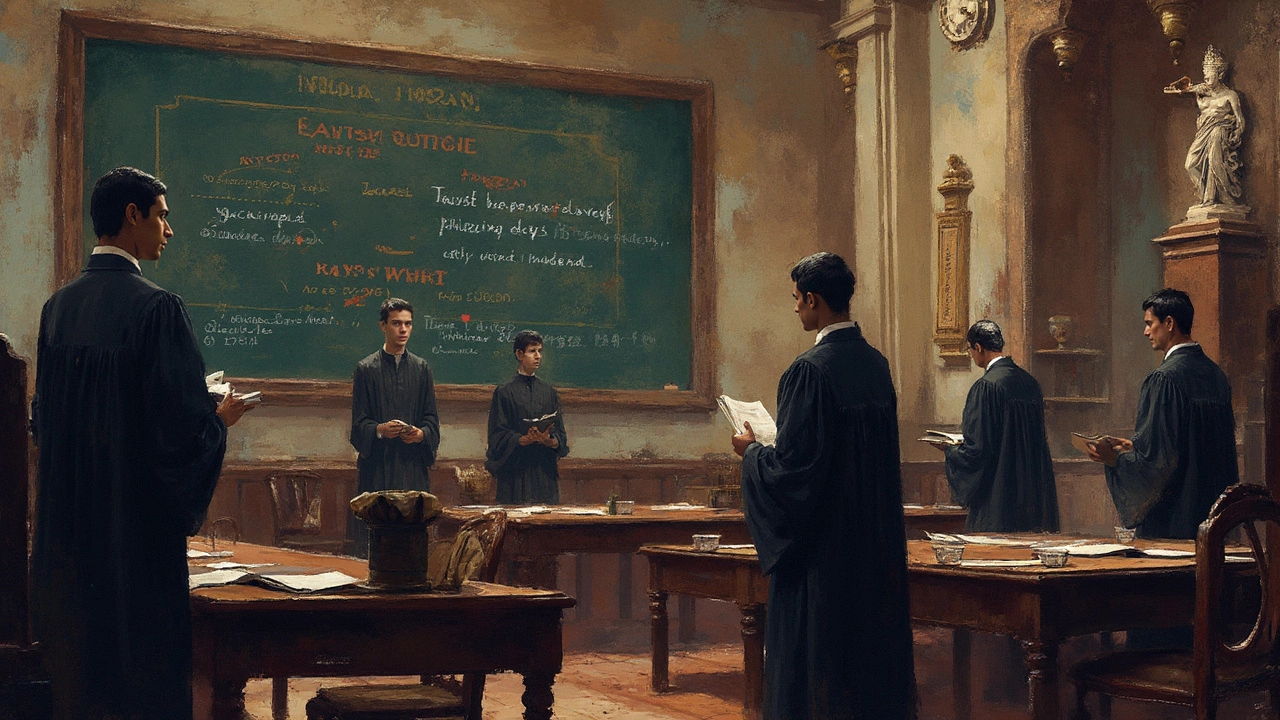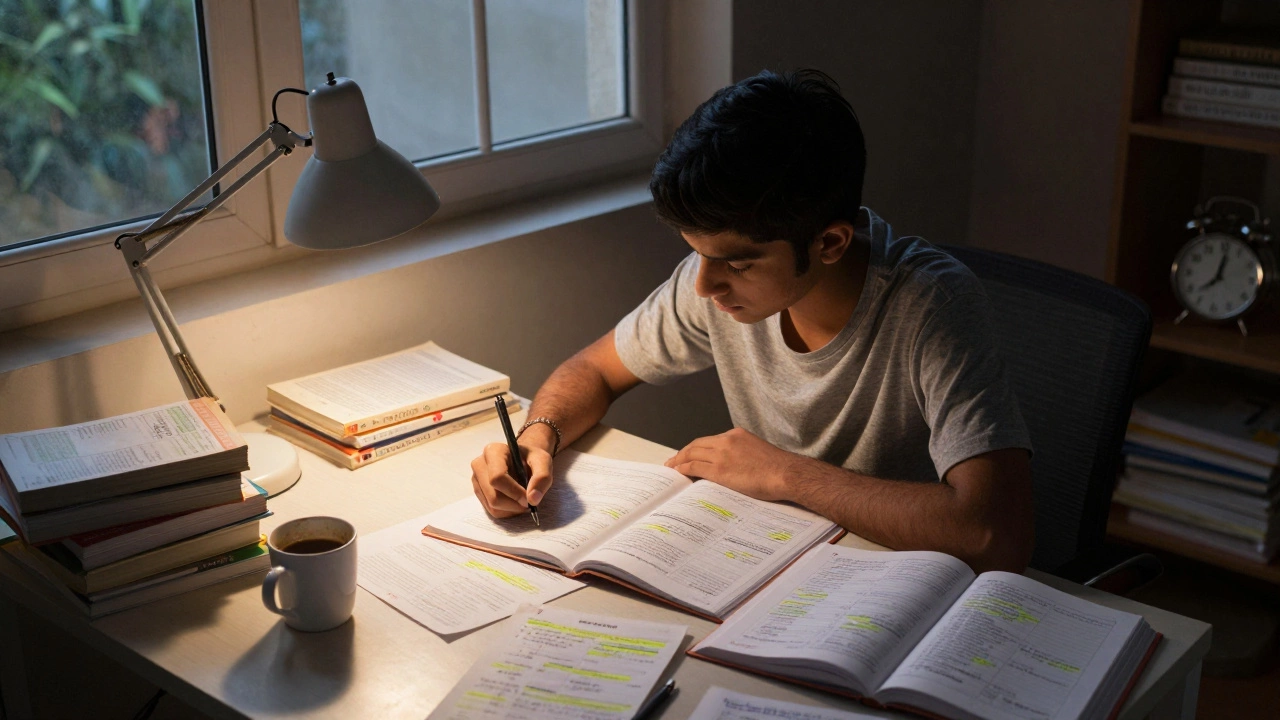Hardest State to Become a Lawyer: Cracking the Toughest Bar Exam

Picture this: you’ve spent years in law school, racking up debt and caffeine addictions, only to realize that passing the bar exam is a whole different beast—especially depending on where you live. Not all state bar exams are created equal. If you’re aiming to work as a lawyer in the U.S., your odds can change wildly based on the state you pick.
California takes the cake as the state with the most notorious bar exam. It’s not just rumor—look at the numbers. Their bar exam isn’t just about legal trivia; you get grilled for two days with essays, performance tests, and hundreds of tricky multiple-choice questions. Even seasoned law grads hit the wall there. A huge chunk of people actually walk out thinking they’ll never set foot in a courtroom in their lives.
But here’s the kicker: it isn’t only about the bar exam. Things like moral character reviews, state-specific law tests, and funky application steps can add extra pressure you might not expect. If you want the easiest ride, you won’t find it in California or a few other states that seem to enjoy dialling up the pain.
Let’s break down what makes a state especially hard for bar hopefuls and see if aiming for a different state could help you sidestep years of stress.
- Where the Bar Exam Hurts Most
- Why Some States Make It So Hard
- Bar Exam Pass Rates: The Real Numbers
- What Extra Hoops Do You Jump?
- Smart Ways to Deal with a Tough Bar
Where the Bar Exam Hurts Most
If you ask law students which state scares them the most, almost everyone says California. The hardest state bar exam has been California’s for years, and the numbers back it up. Only about 50% of first-time takers pass, and it drops even lower for people who didn’t go to law school in California. For comparison, the national average for first-time bar pass rates floats closer to 80% in many other states.
California’s exam isn’t just brutal on paper. It runs for two days, covering every bit of legal ground you can think of—essays, multiple choice, and performance tasks meant to test if you can actually do the job, not just memorize laws. The state even used to have a three-day bar exam, which was no joke. They trimmed it to two in 2017, but it didn’t make it that much easier.
New York isn’t a walk in the park either. While its pass rate is a bit higher (around 66% most years), New York attracts lots of bar takers from abroad and out of state, and they have to pass a separate test called the New York Law Exam. Throw in the Multistate Professional Responsibility Exam (MPRE) that everyone has to take somewhere, and it can be a heavy load.
Here’s a quick look at the most recent first-time bar pass rates from a few notorious states:
| State | First-Time Pass Rate (%) |
|---|---|
| California | 51 |
| Alabama | 66 |
| New York | 66 |
| Florida | 61 |
| Texas | 71 |
It’s not just about pass rates. Some states, like Louisiana, have bar exams with crazy local law questions that stump even the law grads who studied there. Louisiana’s legal system is based on French civil law, not the English common law like every other state. If you try to take their bar exam without being ready for those curveballs, you’ll be wishing you brought a pillow and a lot more snacks.
If you’re thinking about where to practice law, these states really stack the odds against newbies. You have to factor in not just the numbers, but the intensity of the questions and the style of the exam. Making the wrong choice could set you back years—or force you to take the test again and again.
Why Some States Make It So Hard
This isn’t just about torturing would-be lawyers for fun (though it might feel that way during bar study season). States that have a reputation for brutal bar exams usually have a mix of reasons for it. California, for example, has been famous for its grueling format, testing everything from core law subjects to wild-card topics most states skip. New York, Florida, and Texas also push limits—each in their own way.
Why do some states crank up the difficulty? It mostly comes down to a few things:
- Population and demand: States with huge cities like LA, New York, or Houston want to make sure only the best land in court. It’s a control thing—too many lawyers could mean too many problems.
- Legal market competitiveness: More law schools and more law grads means these states get picky. Passing the hardest state bar exam sometimes becomes part of the branding.
- Unique state law: California law isn't just different—it's its own animal. That’s partly why their test isn't just the national Uniform Bar Exam. It’s got sections most students elsewhere never see.
- Tradition: Some states just never bothered to make things easier. They keep the old standards, even as others move to the simpler UBE format.
Check out how the hard states stack up lately—here are 2024’s pass rates for first-time takers:
| State | Pass Rate (2024, First Time Takers) | Exam Format |
|---|---|---|
| California | 56% | California Bar (unique) |
| Florida | 61% | Florida Bar (unique) |
| New York | 68% | Uniform Bar Exam (UBE) |
| Texas | 67% | Uniform Bar Exam (UBE) |
| Louisiana | 49% | Louisiana Bar (civil law) |
You can see why California and Louisiana get flagged—they don’t just have low passage rates, they even have their own separate formats that test local law and procedure. Louisiana, for one, uses a civil law system totally different than the rest of the country. That means law grads from out of state usually have to start their study from scratch.
The National Conference of Bar Examiners called California's exam "the most demanding in the nation—by design, not default."
Here’s the bottom line: the hardest state bar exam isn’t a random badge of honor. It’s a result of state priorities, unique legal traditions, and sometimes just old-fashioned gatekeeping. If you’re aiming there, expect to put up a serious fight just to call yourself a lawyer.

Bar Exam Pass Rates: The Real Numbers
Let’s get real—numbers don’t lie. If you’re serious about becoming a lawyer, you have to look at actual pass rates. The bar exam isn’t just hard in theory. For some states, the stats feel like a brick wall, especially in places like California and a few others trying to catch up.
Take California, for example. In July 2024, the overall pass rate was only 51%. If you didn’t go to a California-approved law school, your odds dropped closer to 23%. That’s an eye-opener for anyone thinking about moving states to take the test. New York, often talked about as tough, had a slightly better rate at about 62% for first-timers. Texas and Florida aren’t handing out licenses easily either, both floating between 62% and 69% for first-time test-takers.
| State | 2024 Overall Pass Rate (%) | First-Time Takers Pass Rate (%) |
|---|---|---|
| California | 51 | 62 |
| New York | 60 | 72 |
| Texas | 66 | 73 |
| Florida | 59 | 69 |
| Alabama | 67 | 75 |
Notice how the hardest state bar exam usually means a lower overall pass rate, but that’s not the only factor. Places with a lot of out-of-state takers tend to see worse numbers, since local law differences can trip people up. Plus, some states only allow you to take the exam a limited number of times before locking you out—California lets you try as many times as you want, but others like South Carolina will cut you off after three fails.
If you’re crunching these numbers as part of your law career plans, remember this: the most popular states aren’t always the softest touch. Check the recent data for wherever you’re thinking and don’t just listen to old myths—look at who’s actually getting through the door.
What Extra Hoops Do You Jump?
If you thought the bar exam was the only big challenge, think again. Several states amp up the pressure by layering on extra requirements that trip up even the most prepared law grads. It's not always what you know—sometimes it's how many steps you can juggle without losing your mind.
Take California, for example. Before you can sit for the exam, you need to clear the "moral character" review, sort out separate applications, and take the Multistate Professional Responsibility Exam (MPRE). And that's pretty standard in the toughest states. Here’s a quick look at what you might face, especially if the hardest state bar exam is on your radar:
- Moral Character Evaluation: States like California and Florida want to dig deep into your background—credit history, criminal record, even old parking tickets. The review process can take up to six months.
- State-Specific Law Tests: New York, Texas, and California all make you learn and pass tests on laws specific to their state, not just general U.S. law.
- Pro Bono or Intern Hours: New York insists you log at least 50 hours of pro bono work before you even get licensed. Maryland has a similar rule.
- Extra Fees and Paperwork: Some states charge big bucks for every little step. Expect to spend over $1,000 before you’re even officially registered for the test in states like California and Illinois.
- Multistate Professional Responsibility Exam (MPRE): Almost every state requires this ethics test, but some (like California) maintain a higher minimum passing score.
If you want a snapshot, here’s how some tough states stack up with extra hoops:
| State | Moral Character Review | State Law Exam | Pro Bono Requirement | Total Typical Fees |
|---|---|---|---|---|
| California | Yes | Yes | No | $1,200+ |
| New York | Yes | Yes | 50 hrs | $1,000+ |
| Florida | Yes | No | No | $1,000+ |
| Texas | Yes | Yes | No | $1,000+ |
These extra steps aren’t just annoying—they can delay your career for months. It pays to track every requirement early and manage your time so nothing catches you off guard. The paperwork alone is enough to scare off people who thought law school would be the hard part.

Smart Ways to Deal with a Tough Bar
Facing the hardest state bar exam isn’t just about grit—it’s about knowing exactly what works and what’s just a waste of late-night study sessions. For example, in 2023, California’s overall pass rate for first-time takers sat around 68%. Not great, but not impossible if you stack the deck in your favor.
Here are some solid strategies for anyone gearing up for a super-tough bar exam:
- Use Official Practice Tests: States like California and New York release past bar questions and model answers. These give you the best sense of what graders want. Don’t just read them—rewrite answers and get honest feedback.
- Get a Prep Course That Matches the State: Not every bar review is equal. For California, Barbri and Themis cover specifics others miss. UBE states? Use Adaptibar for the MBE. Ask people who just passed what they used.
- Budget for Study Time: Treat bar prep like a full-time job—six to eight hours a day, six days a week. That’s what most successful test-takers reported in the National Jurist 2024 survey.
- Take Performance Tests Seriously: This isn’t just multiple choice. States like California give tough practical tests. Review real samples and time yourself doing them under actual bar exam conditions.
- Stick to a Routine: People who nail the bar didn’t pull all-nighters every night—they worked out, ate well, and stuck to a strict, repeatable plan. Sounds boring, but it works.
If you want a peek at what success rates look like, here’s a snapshot of 2024 pass rates from the hardest states:
| State | Overall Bar Pass Rate | First-Time Takers |
|---|---|---|
| California | 52% | 68% |
| Alabama | 63% | 78% |
| Arizona | 65% | 82% |
| Florida | 58% | 74% |
And here's an idea straight from California Bar Exam coach Ben Nisson:
“Success comes down to repeated exam simulation and constant self-assessment. The bar tests thinking under pressure, not just memorization.”
Don’t underestimate group study, either. A lot of folks who pass on their second (or third) try say that joining a focused study group made a massive difference. People hold each other accountable and spot weaknesses you miss alone.
If you’re juggling work or family (shout out to my wife Maya, who managed both with me during bar season), map out a schedule on a whiteboard and stick to it. Seeing your daily goals helps you stay on track—no guessing, just checking boxes.
Tackling a tough bar exam needs hustle and smart planning—not just talent. Stick to proven methods and realistic routines and it’s a whole lot less intimidating than you think.

